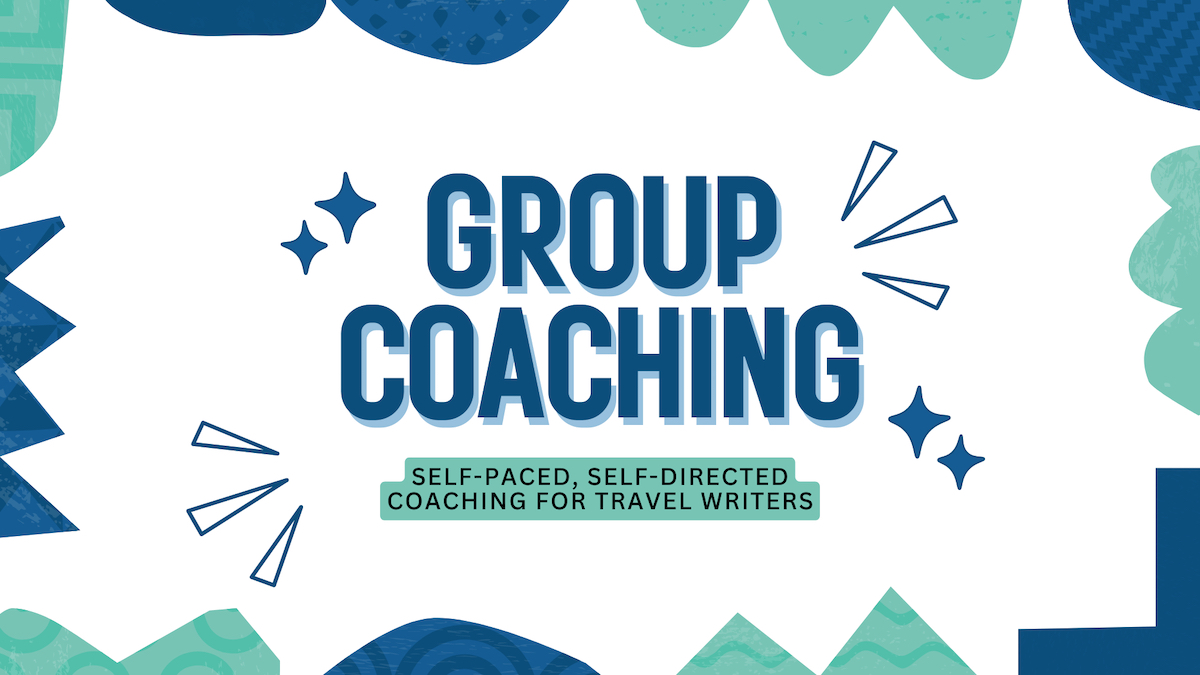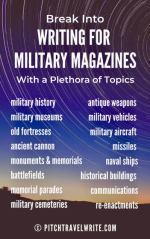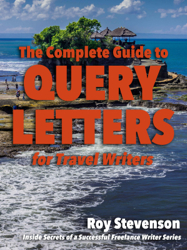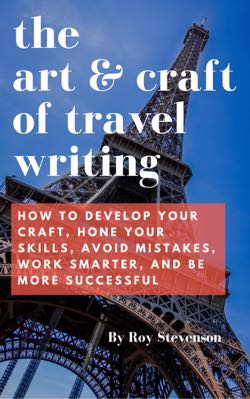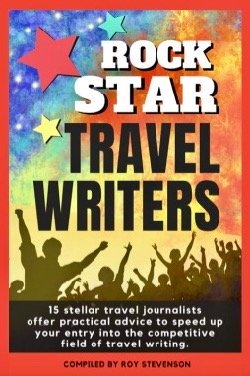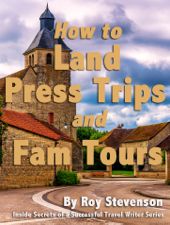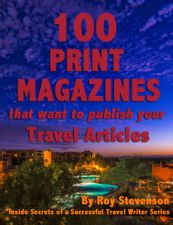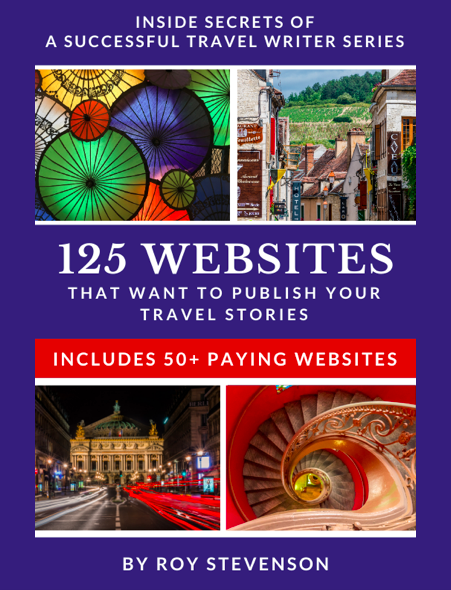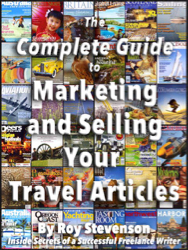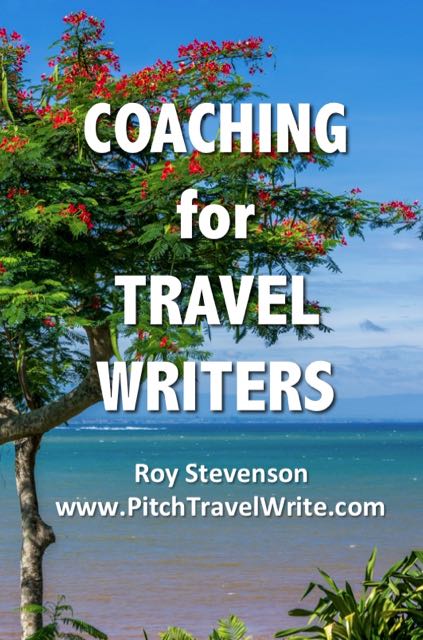Smackdown:
Travel Guidebooks
vs. the Internet
By Roy Stevenson
Sales of travel guidebooks have declined significantly in the past few years. But bookstores still carry hundreds of them. With so much information available on the Internet, are guidebooks necessary anymore?
One of my favorite activities when I’m planning a trip is to get my hands of as much information as possible about the destination. So I use both guidebooks and the Internet for this purpose.
Most people I know rely solely on the internet these days for their travel information. But I think that’s a big mistake! I’ll explain why in this article.
Both guidebooks and the internet have advantages and shortcomings, depending on what you’re looking for and what you’re planning to do with the information.
Here’s how I use both of these valuable sources of information - and what I ignore.
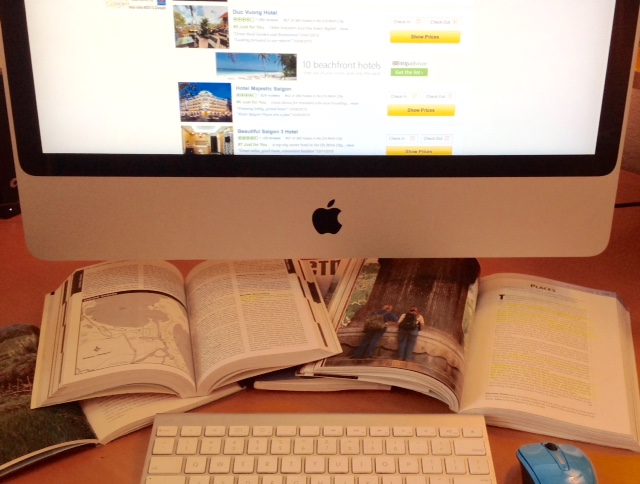
Give me a stack of guidebooks, a highlighter, and an internet connection and I'm in heaven planning my itineraries and searching for story ideas before a trip.
Use Travel Guidebooks for Research
Travel guidebooks still serve a useful purpose. They provide an organized reference for:
• listings of attractions and museums at a destination.
• thumbnail descriptions of local customs
• historical & geographical information
• pictorial maps
• easy-to-follow walking tours that take in the most important sights
For travel writing, I use guidebooks primarily for two purposes:
• When I’m looking for story ideas to pitch in advance of my trip
• To plan my travel itinerary, especially to international destinations
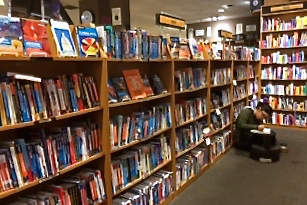
Travel guidebooks are my first reference when planning a trip. I gather as much information from these handy references until I've got everything I can from them. Then I use the Internet to mine those last nuggets of information and fill in the gaps.
Why don’t I start with the internet? Usually I do a cursory search on the internet, but information is so fragmented that it’s easier to do the heavy lifting with a guidebook instead. With so much information in one place, and most of it reliable, it's the best use of my time to start there. Then I supplement with information from the internet.
There's no doubt, the internet is also a good source of information. But beware - you'll also find out-of-date websites, biased reviews and just plain bad information. Use both guidebooks and the internet for comparison before you decide something is “fact”.
Guidebooks can help you plan your daily travel itineraries. But, a single travel guidebook rarely has a complete listing of every attraction at a destination. Studying two or three guidebooks will help you assemble a more complete picture of your destination.
Purchasing several travel guidebooks is an expensive proposition, so choose them carefully before you buy. Look for attractions and information about your specialty interests.
For example, as a World War II enthusiast, I’m almost always disappointed by the inadequate (or non existent) listings of war museums. Related military sights like monuments, memorials, cemeteries, fortresses, and battlefields are also often missing from guidebooks. I purchase the guidebooks that list my special interests and leave the others on the shelf.
Travel Guidebook Shortcomings
Have you ever noticed that some travel guidebooks are written in really small print? Even in my younger days, this was a chore! Their layout can be so hard on the eyes, they automatically exclude themselves when you're making your buying decisions.
Beyond small print, there there are certain chapters in every guidebook I'd recommend ignoring:
• where to eat, and
• where to stay
• tour information
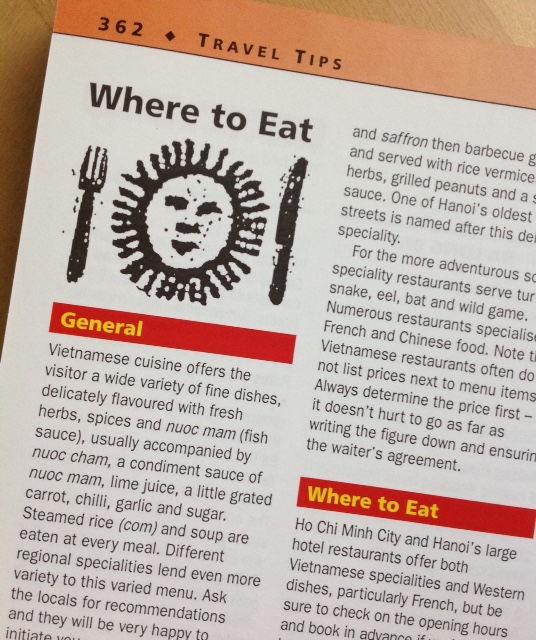
The average guidebook takes 18 months from final draft to hitting the bookshelves, and some take even longer, so any information that changes frequently is likely out-of-date by the time it hits the shelf.
“Where to Eat” chapters are usually out-of-date. By the time you are read the guidebook, many restaurants will have gone out of business or changed hands. Or, once you’re at your destination, you’ll find that guidebook restaurants are clear across town from where you are staying, making them impractical to visit anyway.
Also, “dining out experiences” in travel guidebooks are typically for tourists and you’ll often pay tourist prices for average food. The hotel concierge can usually point you to better local options if you’re unsure of where to go. And spontaneous restaurant discoveries are far more rewarding experiences.
I also tend to ignore guidebook hotel listings. Some travel guidebooks charge hotels a listing fee, so it’s a pay-to-play situation. Be wary - the listings may be limited or biased because of this.
We experienced this shortcoming on a trip to Borneo. I suggested my wife use one of our guidebooks to find a hotel. In one of her weaker moments, she listened to me and chose a hotel that was recommended. The hotel turned out to be fairly dismal and not “a gem” as advertised in the guidebook.
After it was too late to cancel, she realized if she'd done an Internet search she would have found a much better hotel for about the same price. And during the "daily power outages" we had to leave our “gem” hotel. Without power, we were cast into darkness, with no air conditioning or elevator service.
Guess where we went? We headed to a great coffee shop in the "better hotel” we found on the internet. They had a backup generator so power wasn’t an issue.
You can use hotel and resort listings in guidebooks as a starting point, but always do an Internet search for more up-to-date information, more hotel options and a vastly bigger selection of reviews.
The internet's great - but not perfect
To be fair, the Internet has a variety of strengths over travel guidebooks:
• Hotel listings, descriptions, photos and online bookings
• Information on restaurants (menu, hours, location) and online reservations
• Guided tours available and online bookings
• Personal experiences/reviews from individual travelers
For accommodations, the internet has clearly become a better choice than guidebooks. The descriptions are better, there are lots of photos, you have more reviews to peruse, and you can make your booking on-the-spot.
Taking the time to read reviews can help you make your decision about where to stay. But reviews aren’t always accurate. Read them carefully.
Some people are never satisfied with their hotels, and their comments will reflect this. Sometimes rival hotels post nasty comments about their competitors to drive potential guests to their own hotel. And there are biased (positive) reviews by people who were comped at the hotel.
Look for trends. Read between the lines. It’s often wise to ignore the worst comments and the best comments. Try to find the middle ground. Toss out the obvious biased reviews and zero in on what the majority of guests say about a hotel before making your decision.
In general, the biggest weakness of the internet overall is that the information is fragmented. To get a complete picture of any destination you need to look at a variety of sources. It takes a lot of time to do research and half the time you can’t remember what site had any particular information. You'll also find conflicting information.
And, you’ll find biased and unreliable information on the internet, too. It’s hard to tell which sources can be believed sometimes.
Beware of bias and arrogance
It helps to remember the comments found in travel guidebooks and on the internet are written by travel writers. They’re subject to the same human flaws as the rest of us: vanity, pride, arrogance, ego, and inaccuracy to name a few.
One prominent travel guidebook publisher does not hesitate to publish scathing reviews by people who did not have a good experience at a hotel or hostel. When reading a guidebook with an obvious bias, remember this was just one person’s experience. Read the reviews on the internet and try to get a more balanced picture.
Guidebooks and internet sites that publish poor reviews can affect local businesses badly — even put them out of business. Blacklisting a hotel, hostel, or resort seems spiteful to me.
If a guidebook writer doesn’t like a hotel, I personally think they should leave the offending hotel out of the book, rather than do hotel bashing. I don’t believe any guidebook should have the power to close a business down in their own country or another one.
Same goes for the internet. If you don’t like a hotel, just don’t publish it your listings. There’s no need to ruin their reputation based on a single experience.
I’ve also noticed a few guidebooks display an appalling lack of cultural sensitivity. It stuns me to think the editor would even consider printing some of the snide and condescending remarks I’ve read about museums and other attractions.
I’ve seen this behavior on the internet, too, but the internet is free and you can bounce off the page, never to return.
Since you’re spending money on guidebooks, take some time to browse through them. If you find immature and subjective descriptions that seem to have been written by a petulant 12-year-old, don’t waste your money.
A weighty issue
Reading information on the internet is free and lightweight while you’re traveling. It only weighs as much as the device you’re carrying. As long as you have an internet connection, or downloaded the file prior to leaving, it’s a very convenient source of information.
But what if you want access to information in your guidebook while you’re traveling? Guidebooks are heavy! Most are too heavy to carry with you when you travel without giving up other more important travel items.
Here’s what I do. Prior to a trip, if I need a physical copy of something, I photocopy only the pages needed from my guidebook. I leave the book at home. During the trip, I use the photocopies and then discard the pages I no longer need as my tour progresses.
If you don’t need a physical copy, you can scan the pages you need from your guidebook. Then load them onto your iPad or smartphone and you’re all set.
It’s also worth checking if a guidebook is available online or as an eBook. Some are. If you purchase the online version you’ll save yourself the trouble of scanning or photocopying.
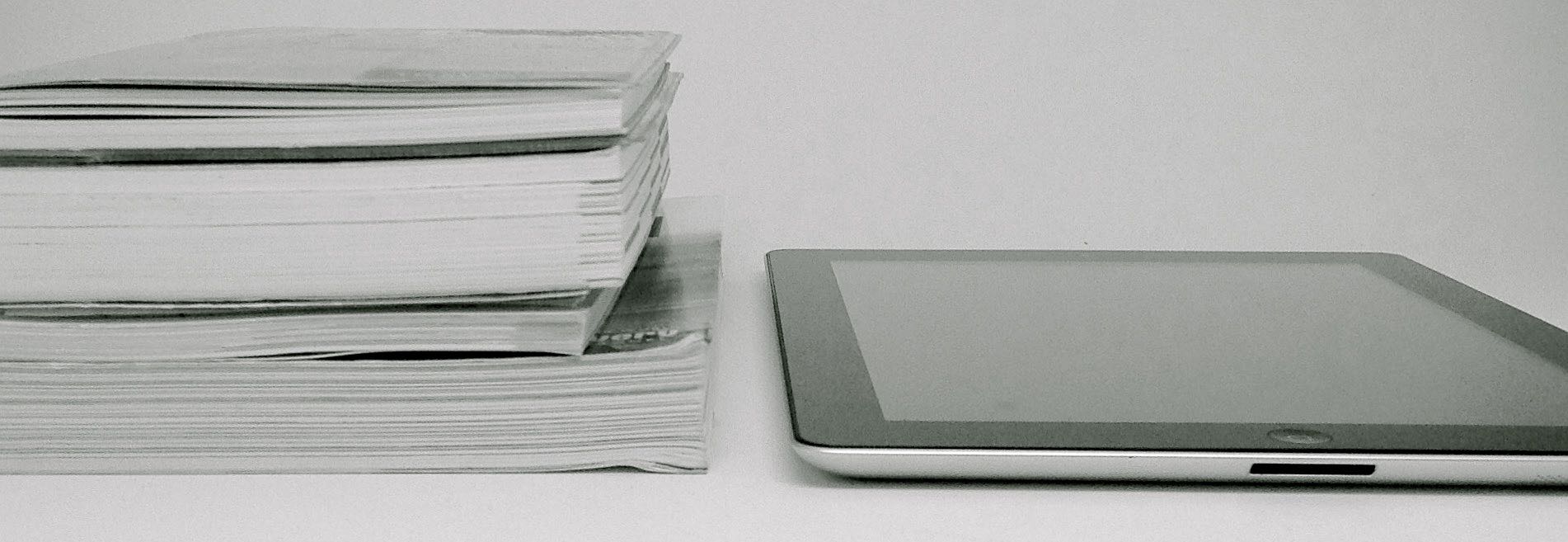
Scanning pages from your guidebooks for reference on the road saves space and weight. The small stack of guidebooks on the left weighed in 4.2 pounds! An iPad weighs less than 1 pound and is useful for other purposes like email, maps, and eBooks, too.
Some final tips
If you don’t want to buy a guidebook, you can check to see if your local library has it. It’s a good alternative to buying them. But I’ve had some bad experiences with the library - the guidebooks are frequently stolen or already checked out. Or they’re woefully out of date — usually by two or three editions. But you might have better luck at your library.
But I prefer to purchase guidebooks so I can write and highlight in the book. Defacing a book, of course, would cause a stern rebuke from your local librarian. So only do this if you own the book.
Which guidebooks are the best? There are several dozen guidebook publishers. I know travel writers who swear by Lonely Planet, or DK, or Rough Guides. The best guidebook is the one you find the easiest to read and navigate. Choose one with the best layout for the way you process information.
Here are some things to consider before making your purchase:
• cost
• size of print
• readability and format
• photos
• maps
• number of pages dedicated to your destination
• overall depth of information
• is it available online?
If you’re planning a big, international trip, I recommend that you read more than one. Buy a couple of books that look interesting to you. Once again, browse before buying so that you’ll be happy with your purchase.
Travel guidebooks still serve a useful purpose. There's a lot of information organized into one volume. It’s easily worth the cost for the convenience of having the information at your fingertips while you’re researching potential travel stories and planning your travel itinerary. And they're also handy later, after your trip, as a reference when you're writing your travel stories.
Related articles that will interest you:
Planning Your Overseas Travel itinerary
Trip planning
Pre-sell Your Stories - Before You Travel

Roy Stevenson is a professional travel writer and the author of www.PitchTravelWrite.com. Over the past ten years, he’s had more than 1000 articles published in 200 magazines, trade and specialty journals, in-flights, on-boards, blogs and websites and has traveled on assignment around the U.S. and to dozens of international destinations.
IF YOU ENJOYED THIS POST, GET UPDATES. IT'S FREE.
